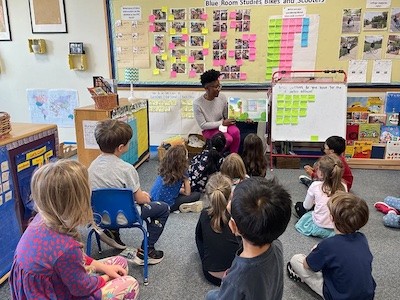People with long COVID often struggle to get sufficient support in the workplace; researchers are no exception.Credit: Vuk Valcic/SOPA Images/Shutterstock
Abby Koppes got COVID-19 in March 2020, just as the world was waking up to the unprecedented scale on which the virus was spreading. Her symptoms weren’t bad at first. She spent the early lockdown period in Boston, Massachusetts, preparing her tenure application.
During that summer of frenzied writing, Koppes’s symptoms worsened. She often awoke in the night with her heart racing. She was constantly gripped by fatigue, but she brushed off the symptoms as due to work stress. “You gaslight yourself a little bit, I guess,” she says.
Soon after Koppes submitted her tenure application in July, she began experiencing migraines for the first time, which left her bedridden. Her face felt as if it was on fire, a condition called trigeminal neuralgia that’s also known as suicide disease because of the debilitating pain it causes. Specialists took months to diagnose her with a series of grim-sounding disorders: Sjögren’s syndrome, small-fibre polyneuropathy and postural orthostatic tachycardia syndrome. To make time for the litany of doctors’ appointments, Koppes took a six-month “self-care sabbatical”.
It’s a bit of a blur, she says, but Koppes, a biochemical engineer at Northeastern University in Boston, describes September 2021 to April 2023 as a dark period in her life. Fortunately, she was buoyed by one monumental victory that preceded it: she was granted tenure in summer 2021.
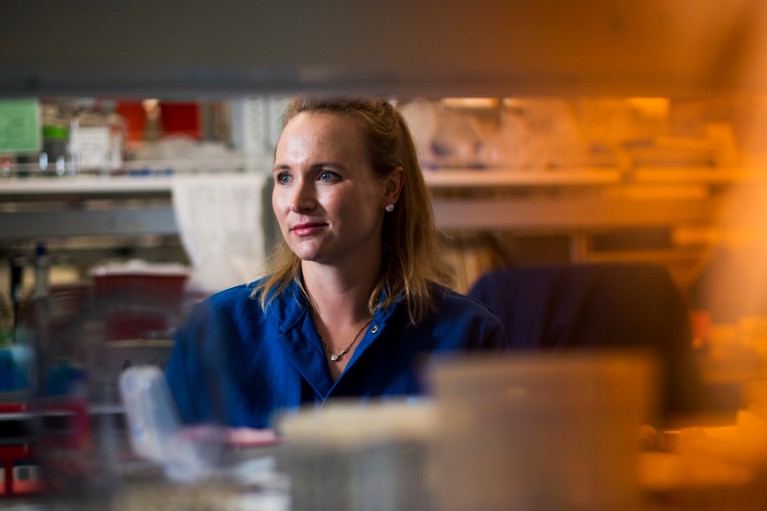
Abby Koppes changed her research focus to study her own experience of long COVID.Credit: Adam Glanzman/Northeastern University
However, other academic researchers with long COVID might not count themselves so lucky. Koppes’s experience has compelled her to speak up for other researchers with the condition. It needn’t spell the end of an academic career, provided institutions step up to help. Nature spoke to researchers living with long COVID to find out how they manage the illness amid the pressures of academic research. (Many requested anonymity for privacy or for fear of repercussions on their careers and reputations.) They describe new realities that include budgeting for periods of fatigue and negotiating adjustments such as flexible working arrangements — an area, they say, in which academia can do better.
When academia meets long COVID
Koppes is one of at least 65 million people worldwide to develop long-term health problems after contracting the virus SARS-CoV-2. The World Health Organization defines long COVID as a suite of symptoms lasting two months or longer, continuing or occurring three months after the initial infection.
Collection: Coronavirus and scientific careers
Common symptoms of long COVID include cognitive impairment, fatigue and immune dysregulation. Weak or overburdened health-care systems in some nations mean many people who have the condition are left without appropriate care.
Moreover, in the cut-throat world of academia, in which it is the norm to push oneself through graduate training and the postdoctoral stage, and as an early-career academic, long COVID throws up barriers for those seeking permanent positions, such as the promised land of tenure.
It could also squeeze diversity out of the talent pool — studies have shown that long COVID tends to disproportionately affect women and people of colour. “Women are already under-represented in higher roles,” says Natalie Holroyd, a computational medicine researcher with long COVID at University College London. “Is this going to exacerbate existing inequality?”
Scientists count the career costs of COVID
“Getting tenure was so profoundly destructive to my health that it prepared my body for severe long COVID,” one Latina researcher in the humanities tells Nature. “I feel like my academic job demands my death.”
Researchers with long COVID often face extra administrative burdens: dealing with the mountains of paperwork for disability claims and workplace-accommodation requests. These tasks can feel like a part-time job in their own right. “Not only are we trying to get all the same work done with many fewer functional hours, but we also have more work to do,” one US-based biology researcher says. “That doesn’t even count all of the extra hours that we have to spend dealing with getting health care.”
There’s also financial pressure. Researchers might feel the need to soldier on to continue to receive a steady income and, in many cases, employer-provided health insurance. The most vulnerable individuals are graduate students and postdoctoral scholars on temporary contracts. International early-career researchers’ visa status can be contingent on working full-time.
In some cases, seeking accommodations can feel out of reach. “I did not go up to anybody and say, ‘Hey, I’ve been dealing with this the entire two years. Can we do something about it?’” says Priya (not her real name), a master’s student with chronic post-COVID-19 health problems at one of the Indian Institutes of Science Education and Research. Organizing a community to advocate for a better learning and research environment takes time, effort and money. Convinced that the university can’t do much, Priya is resigned to bearing her poor health alone. “There are definitely other people here that have similar issues, but I don’t think there’s been a dialogue about it.”
Pandemic productivity loss: how scientific institutions should support academic mothers
Academics with long COVID also face societal ignorance about the condition, with several of those Nature spoke to reporting that they were mainly left to fend for themselves or to navigate workplace accommodation policies that aren’t tailored for long COVID. Many researchers conceal their illness for fear of stigma. Even with understanding colleagues, people with long COVID say they’re exhausted from constantly advocating for their needs and educating others about the condition.
Because some symptoms can be invisible, colleagues might negatively judge a co-worker’s performance or ability to participate. When Sarah (not her real name) started her assistant professorship at a US university, colleagues who were aware of her condition would occasionally tell her that she “looked good” during a meeting. “But it’s because I had very carefully managed my day,” she says. To be able to attend an hour-long meeting at the height of her symptoms, Sarah says she would sleep for two hours beforehand, then for another two afterwards to recuperate. “They don’t realize that there are four hours on either side that were devoted to making it possible.”
The need for extra rest can leave those with long COVID little time for pursuing career-advancing opportunities, especially travel. And because reinfection can exacerbate symptoms, crowd-facing activities aren’t safe, either, when masking is not required.
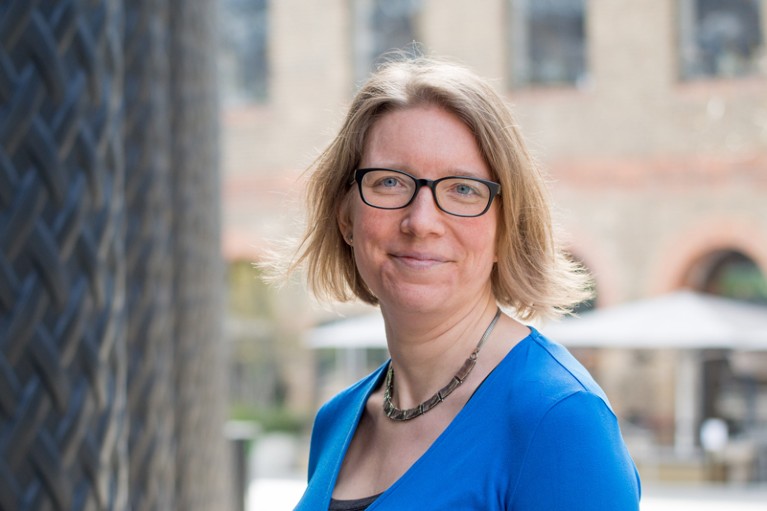
Sociologist Kerstin Sailer had to redefine what it meant to be a researcher living with the disabilities that come with long COVID.Credit: Beatrix Fuhrmann
Many high-achieving researchers with long COVID say that one of their biggest struggles is the loss of their identities that had been pegged to their cognitive abilities and productivity. Often, they learnt the hard way that pushing themselves beyond their limits would only cause them to crash later. “It took me a while to recognize that I am now a disabled academic,” says Kerstin Sailer, a sociology researcher at University College London. She had “to gather around and find my own kind of inner strength and redefine what it means to be me”.
But Sailer and others are a testament to the fact that long COVID need not signal a career dead end. With the right support, affected academics can still thrive.
Accommodations and flexibility
Researchers living with long COVID have found ways to adapt, often relying on assistance from peers. Koppes co-advises all of her students with her husband, an academic at the same university, which is helpful for the days she’s off sick. Other long-haulers have formed online support groups or leaned on collaborators to help them to cross project finishing lines. Kathleen Banks, a public-health doctoral student with long COVID at Boston University in Massachusetts, has an informal dissertation coach who holds her accountable for meeting graduation milestones without pushing her too hard.
Researchers say that the most important form of support is that offered by a compassionate supervisor, be it a department chair or a research adviser. They advise looking for someone who prioritizes your health and doesn’t put undue pressure on you to perform.
Academia’s ableist culture laid bare
Holroyd says she’s grateful for having had the same supportive adviser since her PhD days. “He kept reassuring me that the work that [I’m] putting out is fine, it’s enough,” she says of her now-postdoctoral supervisor. “I’m unlikely to find that level of support elsewhere.”
Ideally, supervisors will also fight for needed accommodations. These can include having a private office, being able to work from home, teaching remotely and having a flexible schedule to deal with an unpredictable ailment.
Employers should also recognize that accommodations, such as virtual working, aren’t one-size-fits-all. Jane (not her real name) is a US-based researcher in the social sciences who developed mast-cell activation syndrome after a COVID-19 infection. In her case, this causes life-threatening allergic reactions to synthetic chemicals in scented products. She requested a high-efficiency particulate air filter for her classroom, but her institution recommended that she teach remotely instead.
However, as other classes at her institution returned to in-person formats, Jane says she noticed that students preferred those to virtual courses such as hers. She’s nervous about the impact this might have on the teaching evaluations that count towards tenure. She has proposed that her institution establish a fragrance-free policy for her office building, but her employers, although receptive, have declined to help her enforce the rules. “It felt like they threw everything at me to advocate for myself,” Jane says. “They basically proposed the remote option as an alternative to all the things that I had requested.”
In many countries, disability laws require employers to make reasonable allowances for disabled workers. Of course, the word ‘reasonable’ is open to interpretation. Not everyone has found workarounds for their job. One mathematics PhD student in the Netherlands quit his programme in his final year after contracting long COVID. And some scholars have pivoted to focus on less physically demanding and more remote-friendly research fields, choosing computational over experimental work, for example, to allow them to sidestep significant hands-on labour.
Many institutions have offered employees with long COVID tenure-clock pauses, deadline extensions and emergency health-related funding. Advocates welcome these short-term support measures, but say more needs to be done. Medical experts don’t know how long the condition might last, so academia needs to formulate long-term policies.
Without such policies, informal arrangements can signal to those with long COVID that they’re a burden. “My experience with the accommodation system has been [that] it just comes down so much to having a supportive principal investigator” to back you up, says one graduate student at a major US university who has long COVID. “That’s just not how it should be.”
Culture shift
Some advocates are calling for a culture that champions workplace accessibility for all: universal design. The concept aims to shift the onus of advocating for particular needs away from the individual. Universal design measures include — by default — live captioning for video-call events and the taking of meeting notes to share with absentees. Researchers with long COVID also advocate for those organizing seminars and conferences to enable remote attendance options.
Brainstorming for these initiatives needs to be a community-wide process, says Emily Shryock, the director of the University of Texas at Austin’s Disability Cultural Center, a community hub for those who identify as disabled and their allies. She recognizes that there will always be tricky situations that have no easy answer. Nevertheless, the broader goal is to reach a middle ground between measures that aren’t required by law any more, such as mask mandates, and individual preferences. “That would be the hope — that every person would feel like they can ask for what they need and be supported in that request, even if, ultimately, they don’t get exactly what they want,” she says.
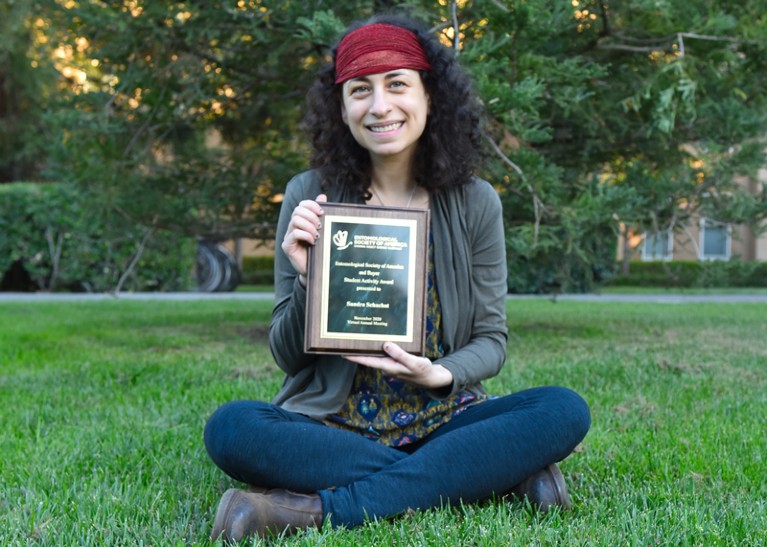
Postdoctoral fellow Sandra Schachat says being vulnerable to contracting long COVID means she is likely to seek remote-working opportunities next.Credit: Andrés Baresch
Universal design is just the first step; academic culture has a long way to go to becoming more inclusive. People like Holroyd choose to stay with trusted advisers so as not to risk working with someone less empathetic. Others are leaving academia altogether. “Why would I want to spend my entire career begging for safety measures that are essential to my survival?” asks Sandra Schachat, a postdoctoral researcher and Schmidt Science Fellow at the University of Hawaii at Manoa. She has dodged COVID-19 so far, but she has an autoimmune disease and knows it makes her vulnerable to the infection’s chronic fallout. Although she says her current lab is “perfect”, she doesn’t trust the larger academic world to protect people like her. So, when her fellowship ends, she plans to explore a career in industry that will allow her to work remotely.
In academia’s rigid research-assessment system, which is based on the quantity of publications and invited talks a person clocks up, people with chronic illnesses find it incredibly hard to compete. Jane, the social scientist, says her university refuses to make exceptions to the tenure policy for those with long COVID. Other affected researchers call for academic success to be reimagined.
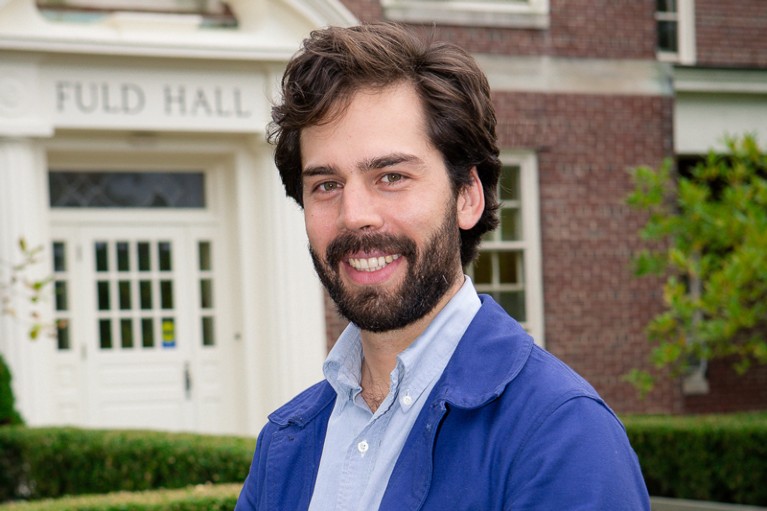
Chris Maddison says long COVID bolsters calls for more flexible research assessments.Credit: Dan Komoda/Institute for Advanced Study
“I do think that [universities] should broaden what they consider to be impact,” says Chris Maddison, a machine-learning researcher with long COVID at the University of Toronto, Canada. That could mean acknowledging different contributions towards society as being equally valuable. For example, in addition to papers published, his field could also count contributions such as releases of scalable, machine-learning prototypes. Nevertheless, Maddison admits that finding the solution to equitable academic assessment isn’t simple. “Maybe long COVID is just one other impetus to say we need to really solve this problem.”
On an individual level, long COVID has also served as a wake-up call to some researchers in relation to their taxing lifestyles. “It’s really forced me to re-evaluate my relationship with stress and my work–life balance,” says one postdoc in the United Kingdom. Now, she is diligent about pacing herself and feels much less guilty for taking breaks. “This experience has helped me develop healthier habits and skills that I’ll carry with me even after I recover.”
On the flip side, the rigours of academic research have also helped to prepare these scholars for the ups and downs of long COVID. “Science has also trained me [to have] resilience, persistence, patience,” says Sarah. “These are helpful qualities when dealing with chronic conditions.”
Koppes agrees. Inspired by her own conditions, she has shifted her research towards the autoimmunity and neurology of long COVID symptoms to interrogate her experience.
For now, Koppes is celebrating the small victories in her slow recovery: being able to walk the dog or take public transport instead of relying on car rides. On her wall at home hangs a reproduction of a painting by the impressionist artist Edward Henry Potthast titled Wild Surf, Ogunquit, Maine. It depicts a beach that she and her husband frequented pre-COVID-19 — a reminder, she says, not of everything she’s lost, but of what she might one day return to.




